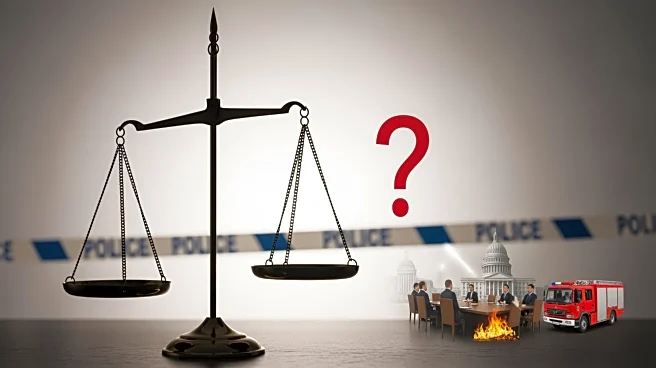What's Happening?
The Supreme Court is scrutinizing President Trump's use of the International Emergency Economic Powers Act (IEEPA) to impose tariffs, questioning whether the 1977 law, intended for national emergencies,
permits the president to unilaterally impose such tariffs. The court's conservative majority, which has often supported Trump, expressed skepticism during oral arguments. The legal debate centers on whether IEEPA, which allows the president to regulate imports during emergencies, extends to imposing tariffs, a power traditionally held by Congress. The case involves tariffs ranging from 10% to 34% on various countries and a 25% tariff on certain goods from Canada, China, and Mexico, justified by the administration as a response to the flow of fentanyl. Lower courts have ruled against the administration, and the Supreme Court's decision could have significant implications for Trump's economic policies.
Why It's Important?
The outcome of this case could have far-reaching effects on U.S. trade policy and the balance of power between the executive and legislative branches. If the court rules against Trump, it could limit the president's ability to use tariffs as a tool for economic and foreign policy, potentially impacting ongoing trade negotiations and economic strategies. The decision could also influence future administrations' use of executive power in economic matters. Businesses and consumers are closely watching the case, as tariffs have contributed to higher costs and economic uncertainty. A ruling against the tariffs could lead to refunds of billions collected under IEEPA, affecting government revenue and business operations.
What's Next?
The Supreme Court is hearing the case on an expedited basis, suggesting a ruling could be issued soon. If the court overturns the tariffs, the government may face demands to repay the $89 billion collected. The decision could prompt the administration to explore alternative legal avenues for imposing tariffs, though these may be more limited. The case has drawn attention to the broader issue of executive power, with potential implications for other areas where the president has sought to act unilaterally.
Beyond the Headlines
The case highlights the ongoing debate over the scope of presidential power and the role of Congress in regulating trade. It raises questions about the use of emergency powers for economic purposes and the potential for executive overreach. The decision could set a precedent for how future administrations approach trade policy and executive authority, influencing the legal landscape for years to come.









